一般现在时讲解及练习
江苏中考英语复习之初中英语主要时态系列(一)—— 一般现在时讲解及练习

一、一般现在时有三种形式1. 谓语是be(am/is/are)的一般现在时。
①肯定形式:主语+be+表语(形容词、名词充当表语)。
I am hungry.You are beautiful.He is a doctor.②否定形式:主语+be+not+表语(形容词、名词充当表语)。
I am not hungry.You aren't beautiful.He isn't a doctor.③一般疑问句形式:Be+主语+表语(形容词、名词充当表语)? 肯定回答:Yes,主语+be. 否定回答:No, 主语+ be+not.—Are you hungry?—Yes,I am./No,I'm not.—Is he a doctor?—Yes, he is./No, he isn,t.④特殊疑问句形式:特殊疑问词+Be开头的一般疑问句?—What is he?—He is a doctor.注意:be要随着主语变。
2. 谓语动词是实义动词(及物动词或不及物动词)的一般现在时。
①肯定形式:“主语+及物动词+宾语”或“主语+不及物动词”。
She has a little brother.她有一个弟弟。
The sun rises in the east.太阳从东方升起。
②否定形式:“主语+don't/doesn't+及物动词+宾语”或“主语+don't/doesn't+不及物动词”。
She doesn't have a little brother.她没有弟弟。
I don't eat every morning.我每天早晨都不吃饭。
③一般疑问句形式:“Do/Does+主语+及物动词原形+宾语”或“Do/Does+主语+不及物动词原形”。
肯定回答:Yes,主语+do/does. 否定回答是:No, 主语+ don't/doesn't.—Do you eat every morning?—Yes, I do./No, I don't.—Does she have a little brother?—Yes, she does./No, she doesn't.④特殊疑问句:特殊疑问词+do/does开头的一般疑问句?What do you like?When do you go to school?注意:根据主语确定用do还是does。
一般现在时讲解及练习
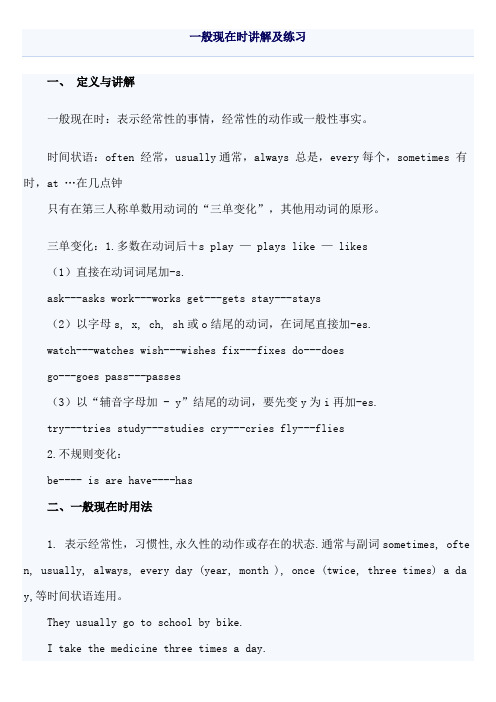
一、定义与讲解一般现在时:表示经常性的事情,经常性的动作或一般性事实。
时间状语:often 经常,usually通常,always 总是,every每个,sometimes 有时,at …在几点钟只有在第三人称单数用动词的“三单变化”,其他用动词的原形。
三单变化:1.多数在动词后+s play — plays like — likes(1)直接在动词词尾加-s.ask---asks work---works get---gets stay---stays(2)以字母s, x, ch, sh或o结尾的动词,在词尾直接加-es.watch---watches wish---wishes fix---fixes do---doesgo---goes pass---passes(3)以“辅音字母加 - y”结尾的动词,要先变y为i再加-es.try---tries study---studies cry---cries fly---flies2.不规则变化:be---- is are have----has二、一般现在时用法1. 表示经常性,习惯性,永久性的动作或存在的状态.通常与副词sometimes, ofte n, usually, always, every day (year, month ), once (twice, three times) a da y,等时间状语连用。
They usually go to school by bike.I take the medicine three times a day.She helps her mother once a week.Mary’s father is a policeman.There are 50 students in my class.2. 表示客观真理,科学原理,自然现象,等客观事实或格言,谚语等。
The sun rises in the east and sets in the west every day.The man who has never been to the Great Wall is not a real man.Tomorrow is Tuesday.三、一般现在时的句子转换:(1)当句子中有be动词或情态动词时,则把be动词或情态动词(can,could等等)提到主语的前面变成疑问句;在be动词或情态动词后面加not变成否定句.例:①陈述句:She is a student.疑问句→ Is she a student?否定句→ She is not a student.②陈述句:I can swim.疑问句→ Can you swim否定句→ I can not swim.(2)当句子中即没有be动词,也没有情态动词时,则在主语前加助动词do (you,以及复数), does(单数she,he,it)变成问句;在主语后谓语动词前加助动词don’t(I, you,以及复数), doesn’t(单数she,he,it)变成否定句,助动词后的动词要变成动词原形。
英语一般现在时讲解及其练习题
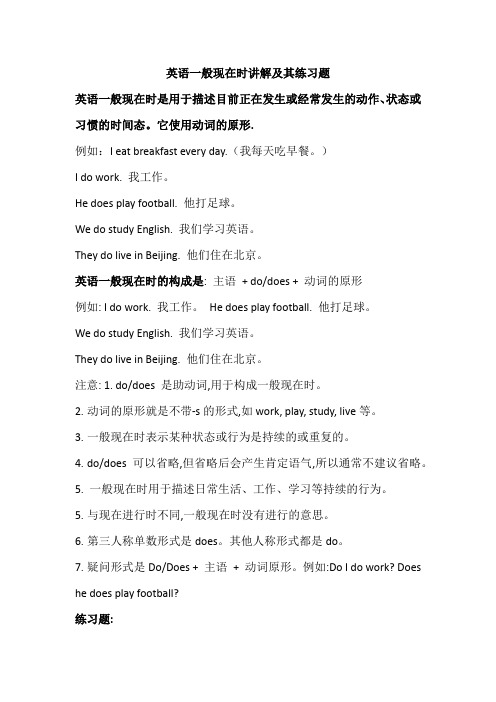
英语一般现在时讲解及其练习题英语一般现在时是用于描述目前正在发生或经常发生的动作、状态或习惯的时间态。
它使用动词的原形.例如:I eat breakfast every day.(我每天吃早餐。
)I do work. 我工作。
He does play football. 他打足球。
We do study English. 我们学习英语。
They do live in Beijing. 他们住在北京。
英语一般现在时的构成是: 主语+ do/does + 动词的原形例如: I do work. 我工作。
He does play football. 他打足球。
We do study English. 我们学习英语。
They do live in Beijing. 他们住在北京。
注意: 1. do/does 是助动词,用于构成一般现在时。
2.动词的原形就是不带-s的形式,如work, play, study, live等。
3.一般现在时表示某种状态或行为是持续的或重复的。
4.do/does 可以省略,但省略后会产生肯定语气,所以通常不建议省略。
5. 一般现在时用于描述日常生活、工作、学习等持续的行为。
5.与现在进行时不同,一般现在时没有进行的意思。
6.第三人称单数形式是does。
其他人称形式都是do。
7.疑问形式是Do/Does + 主语+ 动词原形。
例如:Do I do work? Does he does play football?练习题:一.请改正下列句子中的语法错误并将其变为一般现在时:1.She always drink tea in the morning. -She always drinks tea in the morning.2.They don't likes to eat spicy food. - They don't like to eat spicy food.3.He go to school by bus every day. - He goes to school by bus every day.4. I usually listen music while I work. -I usually listen to music while I work.5.We doesn't have any plans for tonight. - We don't have any plans for tonight.二.请改正下列句子中的语法错误并将其变为一般现在时:1. She always drink tea in the morning. -She always drinks tea in the morning.2. They don't likes to eat spicy food. - They don't like to eat spicy food.3. He go to school by bus every day. - He goes to school by bus every day.4. I usually listen music while I work. -I usually listen to music while I work.5. We doesn't have any plans for tonight. - We don't have any plans for tonight.三.用动词正确的形式填空:1. She ___________ (watch) TV every evening. Answer: watches2. They ___________ (play) basketball on Saturdays. Answer: play3. He usually ___________ (get up) at 6 o'clock in the morning. Answer:gets up4. My sister and I ___________ (like) to read books before bed. Answer: like5. The sun ___________ (rise) in the east and sets in the west. Answer: rises6. We always ___________ (have) lunch at noon. Answer: have7. Tom often _________(go )to the gym after work Answer : goes8 .My mother _________(cook )delicious meals for us Answer : cooks9.He __________ (play) basketball every weekend. Answer: plays10.The cat __________ (run) after the mouse. Answer: runs11. She usually __________ (eat) breakfast at 7 o'clock. Answer: eats12. My sister always __________ (drink) coffee in the morning. Answer: drinks13. Tom often __________ (study) English for two hours every day. Answer: studies四. 请改正下面每个句子的错误,并将其改写成一般现在时。
一般现在时知识讲解与专项练习(讲义)-人教PEP版英语六年级上册

六年级上册一般现在时知识讲解与专项练习一、一般现在时知识点【No. 1】概念:1.表不事物或人物的特征、状态。
如:The sky is blue.天空是蓝色的。
2.表示经常性或习惯性的动作。
如:I get up at six every day.我每天六点起床。
3.表示客观现实。
如:The earth goes around the sun.地球绕着太阳转。
【No.2】时间标志性词:every ... (every day/week/Sunday...)on+星期几(on Mondays/Tuesdays..)频度副词(always, usually often sometimes, rarely, seldom, never)【No.3】结构:①动词原形I like apples.②动词单三形式He plays football.③be动词I am a boy.有be无动(动:实义动词)①肯定句:主语+be+其他He is an English teacher.②否定句:主语+be not+其他He is not an English teacher.③一般疑问句:Be +主语+其他+...?Is he an English teacher?有动无be(动:实义动词)①肯定句:主语(非三单)+动词原形+其他I play football.主语(三单)+动词三单形式+其他He plays football.②否定句:主语(非三单)+don’t+动词原形+其他I don't play football.主语(三单)+doesn’t动词原形+其他He doesn't play football.③一般疑问句:Do+主语(非三单)+动词原形+其他?Do you play football?Does+主语(三单)+动词原形+其他?①肯定形式:主语十情态动词can/may+动词原形+宾语。
小学生一般现在时讲解及练习题
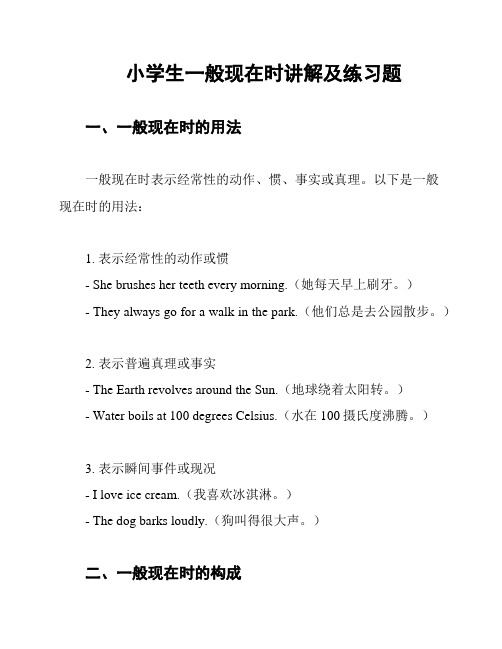
小学生一般现在时讲解及练习题一、一般现在时的用法一般现在时表示经常性的动作、惯、事实或真理。
以下是一般现在时的用法:1. 表示经常性的动作或惯- She brushes her teeth every morning.(她每天早上刷牙。
)- They always go for a walk in the park.(他们总是去公园散步。
)2. 表示普遍真理或事实- The Earth revolves around the Sun.(地球绕着太阳转。
)- Water boils at 100 degrees Celsius.(水在100摄氏度沸腾。
)3. 表示瞬间事件或现况- I love ice cream.(我喜欢冰淇淋。
)- The dog barks loudly.(狗叫得很大声。
)二、一般现在时的构成在一般现在时中,动词的变化相对简单。
1. 对于第三人称单数(He/She/It),动词要加-s或-es。
- He walks to school every day.(他每天走路去学校。
)- She eats an apple.(她吃一个苹果。
)- It runs fast.(它跑得很快。
)2. 对于其他人称(I/You/We/They),动词不变。
- I play soccer on weekends.(我周末踢足球。
)- You read books every night.(你每晚读书。
)- We go swimming in summer.(我们夏天去游泳。
)- They watch movies together.(他们一起看电影。
)三、练题请根据句意填入正确的动词形式。
1. My mother __________ (cook) dinner for us every evening.2. Tom and Lisa __________ (play) tennis on Saturdays.3. The sun __________ (rise) in the east.4. We __________ (study) English at school.5. Dogs __________ (bark) when they see strangers.1. cooks2. play3. rises4. study5. bark希望以上讲解和练习题对你有帮助!。
小学英语一般现在时的讲解和练习

小学英语一般现在时的讲解和练习一、一般现在时的构成一般现在时的构成非常简单,一般情况下,我们只需要在动词原形后面加上-s或-es 即可。
例如:I play basketball.(我打篮球。
)He studies English.(他学习英语。
)She watches TV.(她看电视。
)但是,还有一些特殊情况需要注意:如果动词以辅音字母+y结尾,将y变成i,再加上-es。
例如:study → studies, fly → flies。
如果动词以s、x、ch、sh或o结尾,加上-es。
例如:watch → watches, fix → fixes, teach → teaches。
如果动词以辅音字母+o结尾,加上-es。
例如:go → goes, do → does。
如果动词以元音字母+o结尾,加上-s。
例如:play → plays, enjoy → enjoys。
二、一般现在时的用法表示经常性的动作或习惯。
例如:I usually get up at 7 o'clock in the morning.(我通常早上7点起床。
)表示客观事实或普遍真理。
例如:The sun rises in the east.(太阳从东方升起。
)表示现在的状态或情况。
例如:He is a student.(他是一名学生。
)表示频繁或不断发生的动作或状态。
例如:She always sings when she is happy.(她开心的时候总是唱歌。
)表示说话人的观点或看法。
例如:I think English is an interesting language.(我认为英语是一门有趣的语言。
)三、一般现在时的练习选择正确的动词形式填空。
Tom _______ (like/likes) to play basketball after school.My mother _______ (cook/cooks) delicious food every day.The weather _______ (be/is) fine today.My sister _______ (read/reads) books every night before she goes to bed.The cat _______ (drink/drinks) milk every morning.答案:1) likes 2) cooks 3) is 4) reads 5) drinks用所给单词的适当形式填空。
初中中考英语知识点总结初中英语主要时态系列(一)—— 一般现在时讲解及练习

一、一般现在时有三种形式1. 谓语是be(am/is/are)的一般现在时。
①肯定形式:主语+be+表语(形容词、名词充当表语)。
I am hungry.You are beautiful.He is a doctor.②否定形式:主语+be+not+表语(形容词、名词充当表语)。
I am not hungry.You aren't beautiful.He isn't a doctor.③一般疑问句形式:Be+主语+表语(形容词、名词充当表语)? 肯定回答:Yes,主语+be. 否定回答:No, 主语+ be+not.—Are you hungry?—Yes,I am./No,I'm not.—Is he a doctor?—Yes, he is./No, he isn,t.④特殊疑问句形式:特殊疑问词+Be开头的一般疑问句?—What is he?—He is a doctor.注意:be要随着主语变。
2. 谓语动词是实义动词(及物动词或不及物动词)的一般现在时。
①肯定形式:“主语+及物动词+宾语”或“主语+不及物动词”。
She has a little brother.她有一个弟弟。
The sun rises in the east.太阳从东方升起。
②否定形式:“主语+don't/doesn't+及物动词+宾语”或“主语+don't/doesn't+不及物动词”。
She doesn't have a little brother.她没有弟弟。
I don't eat every morning.我每天早晨都不吃饭。
③一般疑问句形式:“Do/Does+主语+及物动词原形+宾语”或“Do/Does+主语+不及物动词原形”。
肯定回答:Yes,主语+do/does. 否定回答是:No, 主语+ don't/doesn't.—Do you eat every morning?—Yes, I do./No, I don't.—Does she have a little brother?—Yes, she does./No, she doesn't.④特殊疑问句:特殊疑问词+do/does开头的一般疑问句?What do you like?When do you go to school?注意:根据主语确定用do还是does。
(完整)一般现在时讲解与练习(初中英语)
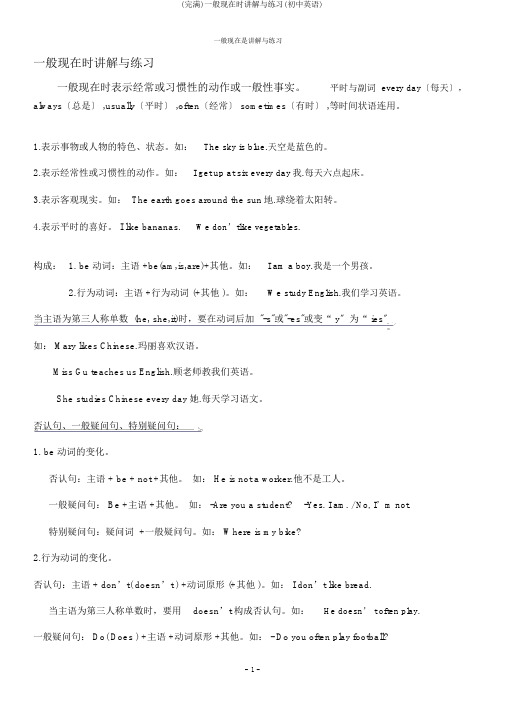
一般现在是讲解与练习一般现在时讲解与练习一般现在时表示经常或习惯性的动作或一般性事实。
平时与副词 every day〔每天〕,always〔总是〕 ,usually〔平时〕 ,often〔经常〕 sometimes〔有时〕 ,等时间状语连用。
1.表示事物或人物的特色、状态。
如:The sky is blue.天空是蓝色的。
2.表示经常性或习惯性的动作。
如:I get up at six every day我.每天六点起床。
3.表示客观现实。
如: The earth goes around the sun地.球绕着太阳转。
4.表示平时的喜好。
I like bananas.We don’tlike vegetables.构成: 1. be 动词:主语 +be(am,is,are)+其他。
如:I am a boy.我是一个男孩。
2.行为动词:主语 +行为动词 (+其他 )。
如:We study English.我们学习英语。
当主语为第三人称单数 (he, she,it)时,要在动词后加 "-s"或"-es"或变“ y〞为“ ies〞如: Mary likes Chinese.玛丽喜欢汉语。
Miss Gu teaches us English.顾老师教我们英语。
She studies Chinese every day她.每天学习语文。
否认句、一般疑问句、特别疑问句:1. be 动词的变化。
否认句:主语 + be + not +其他。
如: He is not a worker.他不是工人。
一般疑问句: Be +主语 +其他。
如: -Are you a student?-Yes. I am. / No, I’m not.特别疑问句:疑问词 +一般疑问句。
如: Where is my bike?2.行为动词的变化。
否认句:主语 + don’t( doesn’t ) +动词原形 (+其他 )。
一般现在时、频度副词讲解与练习

第二单元语法课堂练习一、一般现在时讲解及练习基本用法(1)一般现在时常表示经常发生的动作或经常存在的状态如: I go to school every day.表示此状态时,常和always,often,usually,everyday,sometimes等表示时间的状语连用,有时候时间状语可以不表示出来。
(2)表日常行为:如:The boy wake up at seven a'clock,wash ,dress quickly and run into the dining room for breakfast. They wait until they hear the bell and then go to school.(3)表习惯,能力等:如:Do you drive, Joho?(4)表客观存在:如:Fire burns火会燃烧(表客观事实)The earth moves round the sun.地球围绕太阳旋转(表客观真理) 练习题:1. Tom is a worker. He _____ in a factory. His sisters _____ in a hospital.A. work/ workB. works/ workC. work/ works2. Who _____ English best in your class?A. speakB. speaksC. speaking3. Mrs Read _____ the windows every day.A. is cleaningB. cleanC. cleans4. We _____ music and often _____ to music.A. like/ listenB. likes/ listensC. like/ are listening5. She _____ up at six in the morning. A. get B. gets C. getting6. On Sunday he sometimes _____ his clothes and sometimes _____ some shopping.A. wash/ doB. is washing/ is doingC. washes/ does7. The twins(双胞胎) usually _____ milk and bread for breakfast, but Jim _____ some coffee for it.A. have/ haveB. have/ hasC. has/ have8.Jenny ____ in an office. Her parents ____in a hospital.A work worksB works workC work are workingD is working work9. One of the boys_____ a black hat.A haveB there isC there areD has10. We will go shopping if it____ tomorrow.A don't rain Bdidn't rain Cdoesn't rain Disn't rain11. He said the sun ____in the east and ____in the west.A rose; setB rises; setsC rises, setD rise; sets12. Wang Mei ____ music and often ____ to music.A like; listenB likes; listensC like; are listeningD liking ; listen13. Jenny____ English every evening.A has studyB studiesC studyD studied14. She _____ up at six in the morning.A. getB. getsC. getting15.The students will go to the Summer Palace if it _____ tomorrow. A.don't rain B. doesn't rain C. won't rain16. The picture _______ nice.A.looksB.is lookedC.lookD.is looking17. Don't smoke until the plane ______ off.A.takesB.tookC.was takenD.is take18. John is always ______ others.A. helpB. helpingC. helpsD. to help19. You'd better ______ at home and ______ your homework.A. to stay, doB. stay, doC. to stay, to doD. stay, to do20. Uncle Wang knows _______ a washing machine.A. how to makeB. to makeC. how makingD. what to make21. My father always __________(come) back from work very late.22. The teacher is busy. He __________ (sleep) six hours a day.23. Listen! Joan __________(sing) in the classroom. She often __________ (sing) there.24. __________ your brother __________(know) Japanese?25. Where __________ you __________ (have) lunch every day?26. The girl __________(like) wearing a skirt. Look! She __________(wear) a red skirt today.二、频度副词、短语用法及练习一般现在时常常与always, usually, often, sometimes, seldom, hardly, never等频度副词连用,表示动作发生的频率。
【英语】英语一般现在时解题技巧讲解及练习题(含答案)含解析
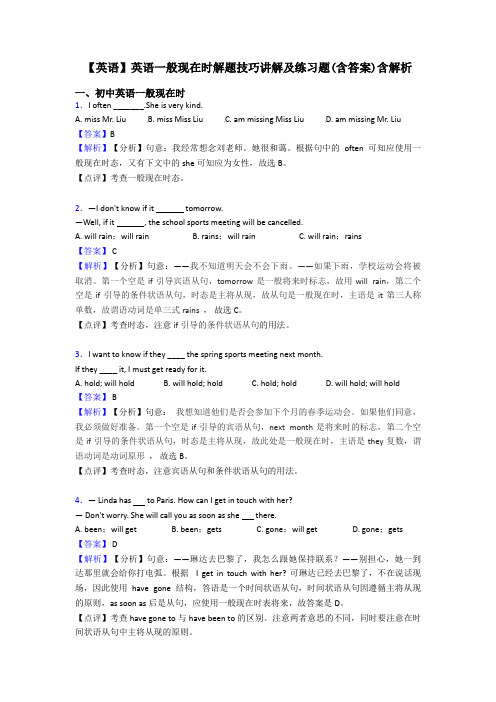
【英语】英语一般现在时解题技巧讲解及练习题(含答案)含解析一、初中英语一般现在时1.I often _______.She is very kind.A. miss Mr. LiuB. miss Miss LiuC. am missing Miss LiuD. am missing Mr. Liu【答案】B【解析】【分析】句意:我经常想念刘老师。
她很和蔼。
根据句中的often可知应使用一般现在时态,又有下文中的she可知应为女性,故选B。
【点评】考查一般现在时态。
2.—I don't know if it tomorrow.—Well, if it , the school sports meeting will be cancelled.A. will rain;will rainB. rains;will rainC. will rain;rains【答案】 C【解析】【分析】句意:——我不知道明天会不会下雨。
——如果下雨,学校运动会将被取消。
第一个空是if引导宾语从句,tomorrow是一般将来时标志,故用will rain,第二个空是if引导的条件状语从句,时态是主将从现,故从句是一般现在时,主语是it第三人称单数,故谓语动词是单三式rains,故选C。
【点评】考查时态,注意if引导的条件状语从句的用法。
3.I want to know if they ____ the spring sports meeting next month.If they ____ it, I must get ready for it.A. hold; will holdB. will hold; holdC. hold; holdD. will hold; will hold【答案】 B【解析】【分析】句意:我想知道他们是否会参加下个月的春季运动会。
如果他们同意,我必须做好准备。
第一个空是if引导的宾语从句,next month是将来时的标志,第二个空是if引导的条件状语从句,时态是主将从现,故此处是一般现在时,主语是they复数,谓语动词是动词原形,故选B。
一般现在时讲解与练习

一般现在时Present Tense一、概念:表示通常性、规律性、习惯性的状态或者动作(有时间规律发生的事件)的一种时间状态。
拆开来讲就是:时间:指动作发生在“现在”的时间段内。
那么,多长的时间才叫“现在”呢?一天?状态:一般现在时最容易迷惑的一个问题,就是拿不准什么叫“经常发生的动作或存在的状态”?这个问题要分三层来讲:1.“经常发生的动作”,比如每天起床、吃饭、上学,一个星期去几次超市或新华书店等。
这些事件中,有的是有规律的,有的是偶尔做几次。
这些都算经常发生的事件。
我们要告诉人们的,是这个动作经常发生,是一般的情况而不是具体的某一次。
2.事物存在的状态。
3.有些动作或状态是永恒的,比如长江向东流、地球绕着太阳转,比如谚语中举的事例、文学作品中描绘的事例,像“好马不吃回头草”等等二、基本用法:1.表示经常性或习惯性发生的动作。
如:I always get up at 7 o’clock in the morning.我总是在早上7点起床。
We often read books at school.我们在学校经常看书。
They usually have dinner at 6:00 in the evening.他们通常在晚上6点吃晚餐。
2.表示现在的状态或特征。
如:She loves English very much.她非常爱英语。
We are always at home on weekends.周末我们总留在家。
Tom is an exellent player.汤姆是一位优秀的运动员。
3.表示客观的现实。
如:The sun rises in the east.太阳从东方升起。
Summer comes after spring.夏天在春天的后面4.用在按计划、规定或安排发生的事情。
如:The plane leaves at 9:30.飞机9点30分起飞。
Tomorrow is Sunday.明天是星期天。
一般现在时讲解及练习(含答案)

一般现在时讲解及练习(含答案)一、单项选择一般现在时1.If he ________ exercise, he______ healthy.A.not; will B.isn’t; won’t beC.doesn’t; will be D.doesn’t do; won’t be【答案】D【解析】【详解】考查if条件句中的时态。
句意:如果他不做运动,他就不会健康。
If条件句,如果主句用一般将来时态,则从句用一般现在时态,且句子主语是he,单数第三人称,故选D。
2.Whene ver you ______ a present, you’d better think about it from the receiver’s preference. A.bought B.buy C.will buy D.have bought【答案】B【解析】试题分析:句意:每当你买礼物的时候,你最好从接收方的偏好想一想。
whenever引导的让步状语从句,采用一般现在时表将来的用法。
故选B。
考点:考查动词的时态。
3.The Dragon Boat Festival ________ the beginning of the hottest season of the year.A.is marking B.marks C.will mark D.marked【答案】B【解析】试题分析:考查时态。
一般现在时表示经常性习惯性的行为。
本句中使用一般现在时端午节标志着一年中最热的季节的开始。
故B正确。
考点:考查时态4.That’s why I help brighten people’s days. If you ________, who’s to say that anothe r person will?A.didn’t B.don’tC.weren’t D.haven’t【答案】B【解析】【详解】考查条件状语从句中动词的时态。
一般现在时讲解及练习
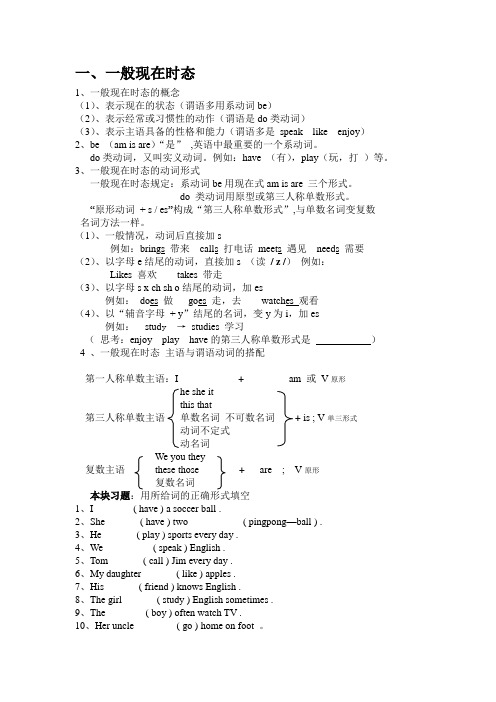
一、一般现在时态1、一般现在时态的概念(1)、表示现在的状态(谓语多用系动词be)(2)、表示经常或习惯性的动作(谓语是do类动词)(3)、表示主语具备的性格和能力(谓语多是speak like enjoy)2、be (am is are)“是”,英语中最重要的一个系动词。
do类动词,又叫实义动词。
例如:have (有),play(玩,打)等。
3、一般现在时态的动词形式一般现在时态规定:系动词be用现在式am is are 三个形式。
do 类动词用原型或第三人称单数形式。
“原形动词+ s / es”构成“第三人称单数形式”,与单数名词变复数名词方法一样。
(1)、一般情况,动词后直接加s例如:brings 带来calls 打电话meets 遇见needs 需要(2)、以字母e结尾的动词,直接加s (读/ z /)例如:Likes 喜欢takes 带走(3)、以字母s x ch sh o结尾的动词,加es例如:does 做goes 走,去watches 观看(4)、以“辅音字母+ y”结尾的名词,变y为i,加es例如:stud y →studies 学习(思考:enjoy play have的第三人称单数形式是)4 、一般现在时态主语与谓语动词的搭配第一人称单数主语:I +am 或V原形he she itthis that第三人称单数主语单数名词不可数名词+ is ; V单三形式动词不定式动名词We you they复数主语these those + are ; V原形复数名词本块习题:用所给词的正确形式填空1、I _______ ( have ) a soccer ball .2、She ______ ( have ) two __________ ( pingpong—ball ) .3、He ______ ( play ) sports every day .4、We ______ ( speak ) English .5、Tom ______ ( call ) Jim every day .6、My daughter ______ ( like ) apples .7、His ______ ( friend ) knows English .8、The girl ______ ( study ) English sometimes .9、The _______ ( boy ) often watch TV .10、Her uncle ______ ( go ) home on foot 。
小学英语一般现在时知识点全面讲解附练习及答案
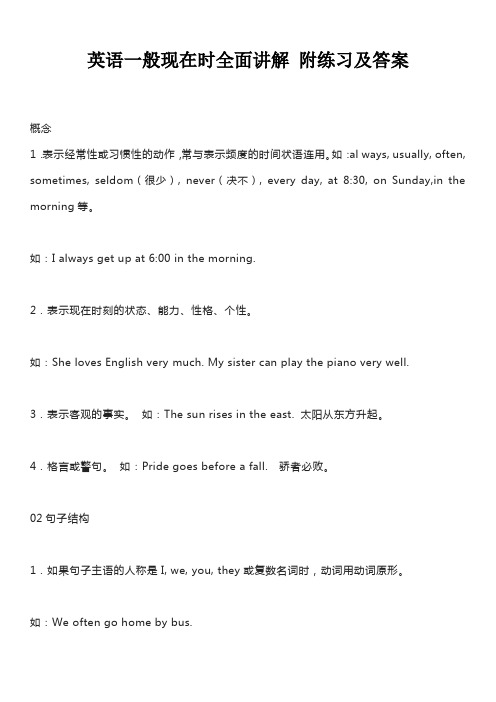
英语一般现在时全面讲解附练习及答案概念1.表示经常性或习惯性的动作,常与表示频度的时间状语连用。
如:al ways, usually, often, sometimes, seldom(很少), never(决不), every day, at 8:30, on Sunday,in the morning等。
如:I always get up at 6:00 in the morning.2.表示现在时刻的状态、能力、性格、个性。
如:She loves English very much. My sister can play the piano very well.3.表示客观的事实。
如:The sun rises in the east. 太阳从东方升起。
4.格言或警句。
如:Pride goes before a fall. 骄者必败。
02句子结构1.如果句子主语的人称是I, we, you, they或复数名词时,动词用动词原形。
如:We often go home by bus.2.如果句子的主语是第三人称单数,即:he, she, it 或单数名词时,动词要用第三人称的单数形式。
如:He often goes home by bus03动词的第三人称单数构成规则1.一般情况下在动词的后面直接加“s”;如:work→works play→plays¬ rain→rains see→sees visit→visits2.以o, x,s,sh, ch结尾的动词,在后面加“es”;如:do→does fix→fixes guess→guesses wash→washes teach→teaches3.以辅音字母加y结尾的动词,先把“y”改为“i”, 再加“es”;如:fly→flies study→studies carry→carries4.不规则变化。
如:have→has04注意在一般现在时的句子中,如果前面使用了助动词does, doesn’t, will, won’t, can, can’t, would, wouldn’t, must, mustn’t 等,尽管主语是第三人称单数,后面的动词用动词原形。
一般现在时的讲解及习题
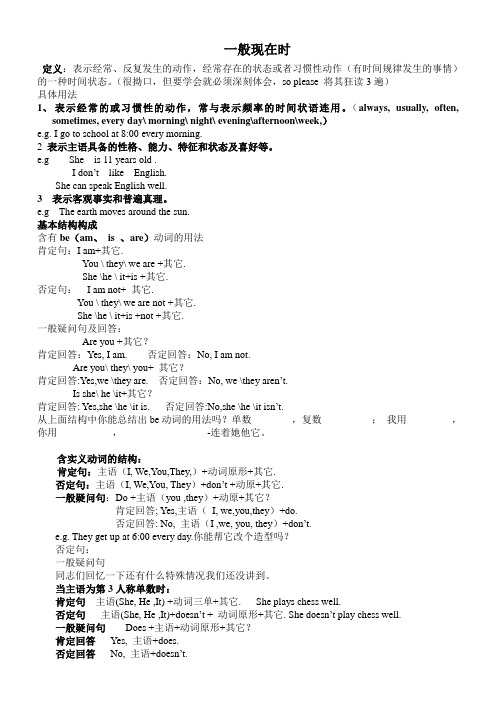
一般现在时定义:表示经常、反复发生的动作,经常存在的状态或者习惯性动作(有时间规律发生的事情)的一种时间状态。
(很拗口,但要学会就必须深刻体会,so please 将其狂读3遍)具体用法1、表示经常的或习惯性的动作,常与表示频率的时间状语连用。
(always, usually, often,sometimes, every day\ morning\ night\ evening\afternoon\week,)e.g. I go to school at 8:00 every morning.2 表示主语具备的性格、能力、特征和状态及喜好等。
e.g She is 11 years old .I don’t like English.She can speak English well.3表示客观事实和普遍真理。
e.g The earth moves around the sun.基本结构构成含有be(am、is 、are)动词的用法肯定句:I am+其它.You \ they\ we are +其它.She \he \ it+is +其它.否定句:I am not+ 其它.You \ they\ we are not +其它.She \he \ it+is +not +其它.一般疑问句及回答:Are you +其它?肯定回答:Yes, I am. 否定回答:No, I am not.Are you\ they\ you+ 其它?肯定回答:Yes,we \they are. 否定回答:No, we \they aren’t.Is she\ he \it+其它?肯定回答: Yes,she \he \it is. 否定回答:No,she \he \it isn’t.从上面结构中你能总结出be动词的用法吗?单数________,复数_________ ;我用_________,你用__________ ,______________-连着她他它。
(完整版)一般现在时的讲解及练习题
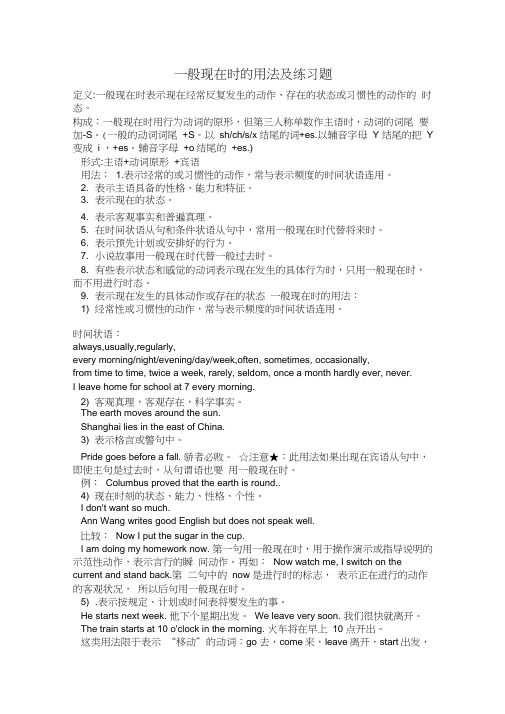
一般现在时的用法及练习题定义:一般现在时表示现在经常反复发生的动作、存在的状态或习惯性的动作的时态。
构成:一般现在时用行为动词的原形,但第三人称单数作主语时,动词的词尾要加-S。
(一般的动词词尾+S。
以sh/ch/s/x结尾的词+es.以辅音字母Y 结尾的把Y 变成i ,+es。
辅音字母+o结尾的+es.)形式:主语+动词原形+宾语用法: 1.表示经常的或习惯性的动作,常与表示频度的时间状语连用。
2. 表示主语具备的性格、能力和特征。
3. 表示现在的状态。
4. 表示客观事实和普遍真理。
5. 在时间状语从句和条件状语从句中,常用一般现在时代替将来时。
6. 表示预先计划或安排好的行为。
7. 小说故事用一般现在时代替一般过去时。
8. 有些表示状态和感觉的动词表示现在发生的具体行为时,只用一般现在时,而不用进行时态。
9. 表示现在发生的具体动作或存在的状态一般现在时的用法:1) 经常性或习惯性的动作,常与表示频度的时间状语连用。
时间状语:always,usually,regularly,every morning/night/evening/day/week,often, sometimes, occasionally,from time to time, twice a week, rarely, seldom, once a month hardly ever, never.I leave home for school at 7 every morning.2) 客观真理,客观存在,科学事实。
The earth moves around the sun.Shanghai lies in the east of China.3) 表示格言或警句中。
Pride goes before a fall. 骄者必败。
☆注意★:此用法如果出现在宾语从句中,即使主句是过去时,从句谓语也要用一般现在时。
例:Columbus proved that the earth is round..4) 现在时刻的状态、能力、性格、个性。
- 1、下载文档前请自行甄别文档内容的完整性,平台不提供额外的编辑、内容补充、找答案等附加服务。
- 2、"仅部分预览"的文档,不可在线预览部分如存在完整性等问题,可反馈申请退款(可完整预览的文档不适用该条件!)。
- 3、如文档侵犯您的权益,请联系客服反馈,我们会尽快为您处理(人工客服工作时间:9:00-18:30)。
一般现在时在特殊疑问句中的运用:
1、什么 2、什么颜色 3、什么时刻 4、谁 5、谁的 6、多少个 7、多少钱 8、几岁 9、多远 10、何时 11、在哪里 12、哪一个 13、怎样 14、什么科目 15、星期几 16、什么日期
what
What colour
用动词的适当形式填空 1.She g_o__e_s(go) to school at eight
o’clock.
3. He usually _g_e_t_s_ up at 17:00.(get )
4. She _li_v_e_s (live) in Beijing.
用动词的适当形式填空
1. Mike_l_ik_e_s_____ (like) cooking. 2. They ___h_a_v_e___ (have) the same hobby. 3. My aunt __lo_o_k_s____ (look) after her baby carefully.
3. Gao Shan’s sister likes playing table tennis (改为一般疑问句)
Does Gao Shan’s sister like playing table tennis?
4. She lives in a small town near New York. (改为一般疑问句)
Tom does his homework.(用they 改写)
They do their homewrk.
将下列句子改为一般疑问句并有做否定回答:
1.He does his homework. Does he do his homework? 2.We do our homework. Do you do your homework? 3.They do their homework.
一般现在时在疑问句中的运用: 1. 一般疑问句: 当句中有Be动词或者情态动词时,直接把be 或者情态动词提前到主语前面。
e.g. You are a student. Are you a student?
You can have a look.
Can you have a look?
当句中没有be或者情态动词时,则直 接在句首加do(does)
A. isn’t B. aren’t don’t
C. not D.
8. Where ____C_____ he _________ from?
A. is, come B. do, come C. does, come D. is , from
9. What language do you ______B____ ? A. say B. speak C. talk D. tell
2.否定回答: Are you a student? ---No, I am not. Can you have a look? ---No, I can not. Do you speak English? ---No, I do not. Does he go to school everyday?
flowers every day 一般疑问句: 划线提问:
14. Tom does his homework at home. 一Do般es疑T问om句d:o his homework at home? 划线提问:
What does Tom do at home?
15.We do our homework every day.
(A)Let's me
(B)Let's us
(C)Let's
(D)Let's to
4.Do they have a new car? Yes,_____.
(A)theyDare
(B)they have
(C)they don't
(D)they do
5.He often ____B_____ supper at 6:00 in the evening.
6. Mike sometimes g__o_e_s_(go) to the park
with his sister.
7. At eight at night, shew_a_t_c_he(wsatch) TV
with his parents.
8. _D_o__e_sMike r_e_a_d_(read) English every
1.I want__B__homework now.
(A)doing
(B)to do
(C)to do my
(D)do my
2.It's time_C_____.
(A)go to school (B)play games
(C)to go home (D)to do my homeworks
3.___C___go and help her.
用词的适当形式填空。 1. Miss Guo ______ (teach) us Chinese this term. She ______ (be) a very good teacher. She often ______ (talk) with us after class. Many of us like ______ (talk) with her.
e.g. You speak English. Do you speak English? He goes to school everyday. Does he go to school everyday?
用动词的适当形式填空
1. We often _p_l_a_y_ (play) on the playground.
2. He __g_e_t_s_ (get) up at six o’clock.
3. __D_o__ you _b_r_u_s_h(brush) your teeth every morning?
5. Danny_s_t_u_d_i_e_s_(study) English,
Chinese, Maths, Science and Art at school.
---No, he does not.
改句子
1. Do you often play football after school? (肯定回答)
Yes, I do. 2. I have many books. (改为一般 疑问句并作否定回答)
Do you have many books?
Yes,I do.
day?
9. How many lessons _d_o_e_s_ your classmate _h_a_v_e__(have) on Monday?
10. What time _d_o_e_s__ his mother _d_o___(do) the housework?
一般疑问句的回答: 1. 肯定回答 Are you a student? ---Yes, I am. Can you have a look? ---Yes, I can. Do you speak English? ---Yes, I do. Does he go to school everyday? ---Yes, he does
7. We have four lessons.(改为一 般疑问句,并作肯定回答)
Do you have four lessons?
Yes,we do.
9. My dog runs fast. (一般疑问句并否定回答):
Does your dog run fast?
No,it isn’t.
注意:当主语是第一人称、第二人称或者是 复数的时候,谓语动词用动词原型;当主 语是单数第三人称时,谓语动词需要变型, 一般情况下在谓语动词后加s/es。
一般现在时
---用法及练习
一.用法: 1. 表示现在经常或者习惯发生的动作 2. 陈述现在的某一个客观事实 3. 陈述某个客观真理
二. 结构: 主语+V原型(s/es)
e.g. 1. I always go to school on foot. 2. I am a teacher./ I am a student. 3. The sun rises from the East.
6.One of my classmates comes from Australia. Where Does one of your classmates come from?
7.Lucy usually gets up at 6:30 in the morning. When does Lucy get up in the morning?
What time
who whose,
how many
how much,
How old How far when
where which how
What subject
What day What#43;谓语+主语 也就是在一般疑问句的语序前加上疑问 词。
12. Su Yang usually washes
e.g. I go to school everyday.
He goes to school everyday.
I do my homework.(用He 改写) He does his homework.
She does her homework.(用we改写) We do our homework.
A. have C. is having
B. has D. has got
6. We ____C_________ any Chinese
